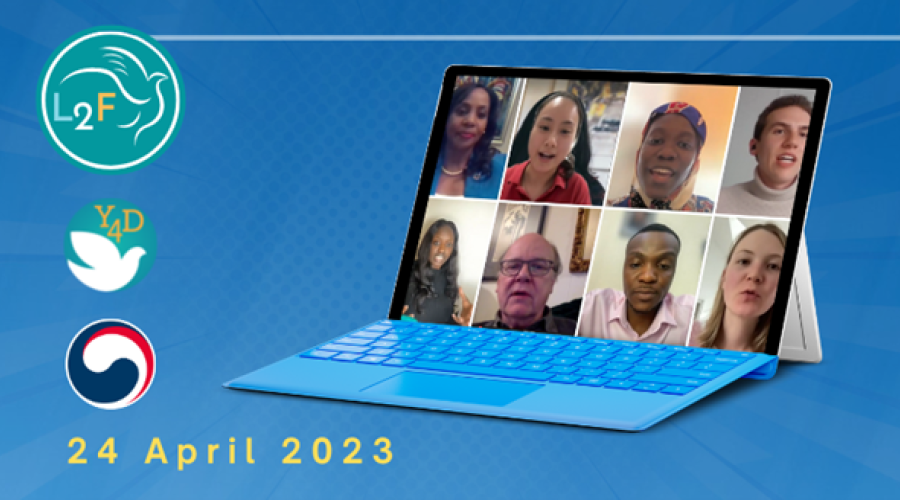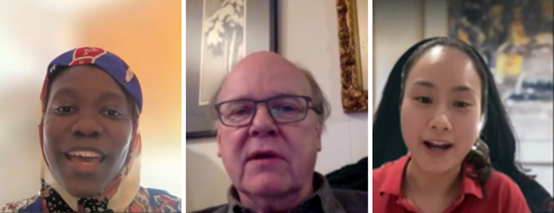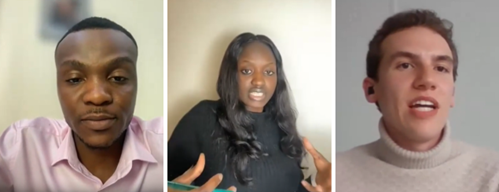News story
Leaders to the Future explore ways to strengthen multilateralism in the field of disarmament

On Monday 24 April, the Leaders to the Future gathered for a virtual workshop on the role of multilateralism in the field of disarmament, non-proliferation, and arms control to mark the International Day of Multilateralism and Diplomacy for Peace.
Multilateralism is crucial for tackling the complex global challenges facing the international community, including rising temperatures, increasing global tensions, and growing inequalities. During the session, the participants discussed and shared their perspectives on multilateralism, as well as developed recommendations for facilitating the participation of young people in multilateral processes and decision-making mechanisms.
To open the session, Ms. Soo Hyun Kim, Political Affairs Officer and #Youth4Disarmament Lead with the United Nations Office for Disarmament Affairs (ODA), reflected on the evolution of the #Youth4Disarmament initiative since its establishment in 2019. “I am proud to see so many of our previous participants continuing their engagement and journey with the #Youth4Disarmament Initiative as Leaders to the Future, supporting one another and exchanging ideas to develop recommendations to advance our collective disarmament objectives,” she said.
Reflecting on the session’s topic, Ms. Kim noted that the discussions held as part of the Leaders to the Future series embody the essence of multilateralism by bringing people together from across the world to share their ideas to establish a safer, more sustainable future for all.
In opening remarks, H.E. Shorna-Kay Richards, Ambassador of Jamaica to Japan and a member of the United Nations Secretary-General's Advisory Board on Disarmament Matters, shared insights from her experience working within multiple multilateral processes, including the negotiations of the Arms Trade Treaty. Reflecting on her participation as a UN Disarmament Fellow, Ambassador Richards urged participants to act upon the friendships forged and networks established through the Leaders to the Future series. “For cooperation and shared understanding are key ingredients in fostering an environment in which disarmament truly becomes the art of the possible,” she said.

In her role as a member of the United Nations Secretary-General’s Youth Advisory Board on Climate Change, Ms. Fatou Jeng noted her intention to hold consultations with youth around the world to share their insights with the UN Secretary-General. She noted her passion to amplify the voices of young people most affected by the climate crisis. "I am going to be bringing the voices of young people from this particular side of the world who do not have access to opportunities and resources to participate and contribute, as well as shape the climate policies to be implemented," Ms. Jeng said.

Mr. Randy Rydell, Executive Advisor at Mayors for Peace and former Senior Political Affairs Officer with ODA, provided an informative overview of the role of multilateralism in the history of the United Nations. He noted that the political will of Member States is crucial for the maintenance of international norms, especially within the disarmament field. Mr. Rydell also noted the role of civil society in raising awareness on disarmament and non-proliferation with the wider public through research and advocacy efforts.
Ms. Linh Trang Phung, UN Youth Champion for Disarmament and Leader to the Future, shared reflections from delivering remarks to the formal plenary of the Conference on Disarmament in 2021, which inspired her to keep working for disarmament. She also presented her project to engage, educate, and empower youth with the group, titled ‘Youth Leaders for Disarmament’. The project engaged over 200 Vietnamese youth on general principles of disarmament, non-proliferation and arms control through virtual sessions with disarmament experts and other youth advocates.
Following the presentations, the speakers engaged in a Q&A session with the participants on topics including the efforts of the UN to strengthen multilateralism, ways for young people to actively contribute to multilateral processes, activities to amplify the voices of Hibakusha and the current challenges facing the international community.

In small breakout groups, the Leaders to the Future discussed the concept of multilateralism and the importance of providing opportunities for young people to participate and contribute to decision-making processes. The findings will be published in a set of recommendations to be presented during the participants’ upcoming study visit to UN Offices. In closing, Mr. Percy Abainvihdan, one of the Leaders to the Future, shared a translation of ‘multilateralism’ into his native language; “Ubuntu” meaning togetherness and solidarity. Through expressing their views and perspectives on multilateralism, the Leaders to the Future will work together to cultivate collective action towards a safer, more sustainable future for current and future generations.